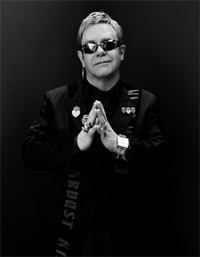
The Mawazine Festival is an annual international music festival held in Rabat and has attracted several big names over the years such as Stevie Wonder, Kylie Minogue, Alicia Keys and Whitney Houston. This year’s festival, which runs through May 29, will bring the likes of Harry Connick Jr., Al Jarreau, Deolinda, Carlos Santana, B.B. King and, yes, Sir. Elton John, to Morocco’s capital.
Immediate criticism came from members of Morocco’s main Islamist opposition party, the PJD, who “categorically reject[ed] the appearance of this singer [Elton John] because there is a risk of encouraging homosexuality in Morocco.”
Many prominent civil society leaders “categorically rejected” this criticism and took a surprisingly strong stand to support and defend what organizers of the festival called “diversity and cultural tolerance.”
In the end, despite all the outcry, debate and heightened security, an estimated 30,000+ turned out to “feel the love tonight.”
To call this week’s clash a debate over homosexuality in Morocco would be simplifying a larger challenge faced by all the countries in the region—reconciling the complexities of tradition, religion, tolerance, modernity and progress. To merely say that allowing Elton John to perform is a sign that Morocco is becoming more “Western” is also short-sided (and, frankly insulting—as if to say that tolerance and modernity are uniquely “Western” values.) Morocco, as are its neighbors to varying degrees, is forging its own path to openness in our increasingly connected world which forces confrontation between diverse cultures and larger-than-life personalities.
Thank you, Sir.